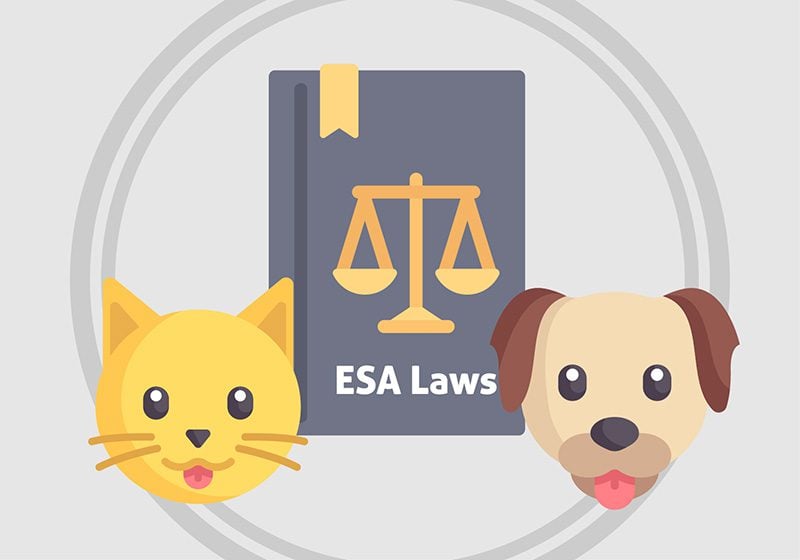Oklahoma provides no additional laws to protect an individual with emotional support animals. Even though there are federal laws that protect emotional support animals for housing, they don’t protect them for public accommodations. This means that if you have an emotional support animal, it is unlikely you will be able to enter a place of business or public accommodation with them.
It is never okay to state that your animal is a service animal if it is not certified to be one. Federal ADA law states that service animals are dogs that have been trained to perform a certain task or service that is related to an individual’s disability. Oklahoma law only covers service animals that are dogs and individuals with physical disabilities, such as being blind, deaf, or hard of hearing.
All public accommodations are required to follow both federal and state laws. If we look at both laws, we can see that only animals that are dogs that have been trained to perform a certain task related to an individual’s disability are considered service animals. Since federal law covers all disabilities, Oklahoma must accept service dogs for all disabilities as well.
If you are not sure if your emotional support animal is considered a service animal, there are a few easy questions that can clear that up for you. The first thing you should ask is if your emotional support animal is actually certified to perform any task for you due to a disability.
If the answer is yes, then ask yourself if your emotional support animal is a dog or not. If your emotional support animal is certified and a dog, then they fall under a service animal and an emotional support animal. This is important to know so that you know what protections your animal has.
Restrictions on Emotional Support Animals
Emotional support animals are not allowed in public accommodations that restrict animals. These businesses are required to allow service animals without proof, but not emotional support animals. Since emotional support animals do not require training, they are considered unreliable to act properly in a place of business.
They also might provide a distraction for service animals that are required for people with disabilities. Since Oklahoma doesn’t consider emotional support animals, they are not treated the same in the eye of the law.
Even though owners are not allowed to ask for proof of certification for service animals, it is against the law to imply that your dog is a service animal if it has not been trained to perform the task that would help you with your disability.
Different Types of Laws for Emotional Support Animals
Even though Oklahoma doesn’t provide any specific laws to protect emotional support animals, the federal government does protect housing inclusion for emotional support animals. The Fair Housing Act requires that all assistance animals be allowed housing, which includes apartments, homes, hotels, and motels. Any place a person with a disability might stay overnight, their assistance animals must be allowed to stay as well.
Assistance animals are all animals that provide services or any type to people with disabilities. This means that they do not have to be dogs, and they do not have to be certified. If you use an animal different from a dog as your emotional support animal, they are covered under this law.
Due to changes to the Air Carrier Access Act, airlines are no longer required to allow emotional support animals in the cabins of their planes. Now, the Act only protects service dogs from being unfairly removed. If your ESA is small enough, you may be able to bring it into the cabin as a carry-on that you stow under your seat for a fee.
Otherwise, if you have a dog, you can train it to be a psychiatric service dog (PSD) that performs tasks to aid with your mental health disability. As service animals, PSDs are also protected by the Air Carrier Access Act. However, be aware that airlines are within their rights to have you fill out a form about your service dog; this form will ask for the information of the organization or person who trained your PSD.
Psychiatric Service Dog in Oklahoma
Psychiatric service dogs are a specialized type of service dog. These animals help people who have mental health disorders or mental disabilities. Depending on the person’s needs, psychiatric service dogs can be trained in a handful of ways to help with symptoms of mental health problems.
Some examples of tasks that psychiatric service dogs can perform include the following:
- Open/close doors
- Retrieve water/drinks
- Get help for someone from the authorities
- Ensure that people are comfortable when around triggers
- Removing people from social settings when anxiety settles in
- Providing deep pressure therapy
Aside from performing tasks, service dogs learn about their owner’s emotions. Doing so helps them prevent panic attacks before they happen.
Service dogs also have unique protections due to the Fair Housing Act (FHA) and the Americans with Disabilities Act (ADA). These acts protect service dogs from discrimination by landlords, employers, and public spaces. This also includes businesses with no-pet policies.
PTSD Service Dog in Oklahoma
Psychiatric service dogs can be trained to handle many tasks and specializations. One such specialization is taking care of people who have post-traumatic stress disorder (PTSD). Dogs trained to help with PTSD are trained to handle specific tasks. These include things like keeping their owners away from triggers or escorting their owners to safety.
Aside from helping with triggers, PTSD service dogs can also help someone regulate their emotions. This helps people get through panic attacks and other problems that people with PTSD experience. Like other service animals, PTSD service dogs are protected under laws like the Fair Housing Act and Americans with Disabilities Act.
Providing Proof
It is against the law for proof to be asked for before service animals enter a public accommodation, but landlords can ask for proof that you need your ESA. Even though individuals can not be turned away from housing because of their assistance animal, they do have to provide proof of the disability that requires the animal and proof that the animal has been registered as such.
Providing proof before renting allows for all parties involved to be protected. Having this proof on file makes sure that landlords cannot require you to produce a pet deposit or deny you residency at a location that doesn’t allow pets. “No pets allowed” doesn’t apply to assistance animals, which are service animals and emotional support animals.
Why Emotional Support Animals Are Important
Emotional support animals provide an important service to individuals that might need a little extra support and comfort to get through their day. These emotional support animals allow them to live a better quality of life and to feel less stressed. To some, their emotional support animals are just as important as a service animal.
Why You Should Register Your Animal With USSA
USSA makes registering your emotional support animal, or service animal, very easy. It is as simple as answer a few questions and receive your proof. They also provide a quick place to receive a doctor’s note.
It is also important to have your registration for your emotional support animal on hand at all times, just in case something unexpected comes up. While registration is not legally required, it can help provide additional proof when needed – and it is important to be prepared instead of trying to get everything handled last minute.

